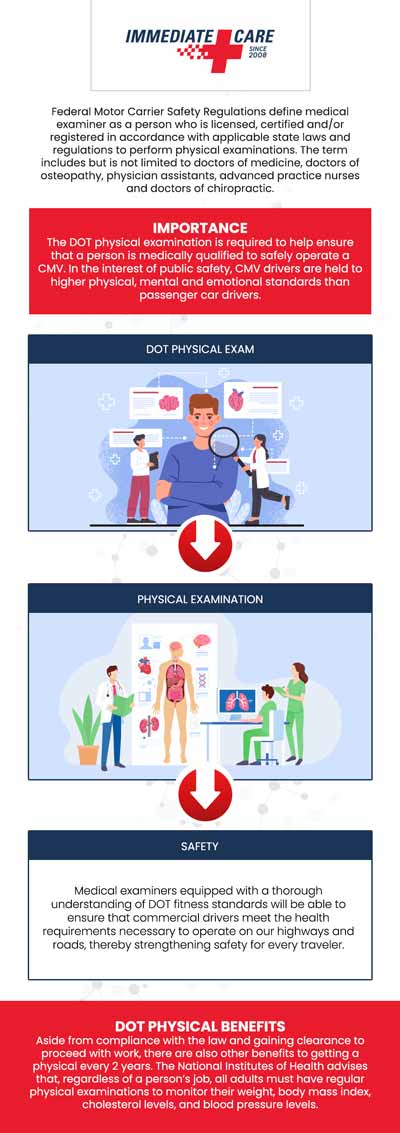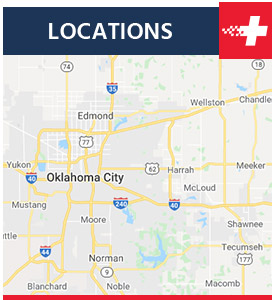Everything You Need to Know About DOT Physical Exams
If you’re seeking a reliable DOT physical exam, look no further. Dr. Kevin Penwell (D.O.), and his team at Immediate Care of Oklahoma are dedicated to providing comprehensive evaluations to ensure your fitness to operate commercial vehicles. Schedule a consultation today to learn about the DOT physical exam process and requirements. For more information, contact us or simply walk in. We have convenient locations to serve you in Edmond OK, Norman (24th) OK, Norman (HealthPlex) OK, Tecumseh OK, West Moore OK, I-240 & Sooner RD OK, Yukon OK, and Choctaw OK.




Table of Contents:
What are the requirements for passing a DOT physical?
Can I still drive if I wear glasses or contact lenses?
What medications can disqualify me from a DOT physical?
Can I pass a DOT physical if I have a history of heart disease or stroke?
The DOT physical, a mandatory medical evaluation for commercial truck drivers, ensures their physical and mental well-being is suitable for safely operating large commercial vehicles. To pass this rigorous exam, drivers must meet specific health and safety standards, including the following list of specific requirements.
● Vision:
o You must have at least 20/40 vision in both eyes, with or without prescription lenses.
o You are required to be able to distinguish between red, green, and amber.
● Hearing:
o A “forced whisper” must be audible from at least 5 feet away, with or without hearing aids.
o If you have hearing aids, you must wear them throughout the exam and carry a spare set while driving.
● Blood Pressure:
o Your blood pressure should generally be less than or equal to 140/90 mmHg, with or without medication.
o Higher blood pressure may still allow certification but may require more frequent monitoring or shorter certification periods (e.g., 1-year certification instead of 2 years).
● Blood Sugar:
o Your blood sugar levels must be within a safe range. If you have diabetes, it must be well-managed, and you cannot have any episodes of hypoglycemia (low blood sugar) requiring assistance in the past 12 months.
o You may need to provide proof of blood sugar control (e.g., hemoglobin A1C levels) if you have diabetes.
● Medical Conditions:
o You cannot have any conditions that would interfere with safe driving. This includes conditions like epilepsy (seizures), uncontrolled diabetes, or certain cardiovascular issues like heart disease without proper management.
● Drug and Alcohol Testing:
o You must undergo a drug and alcohol test. Testing positive for controlled substances disqualifies you from certification.
● Physical Fitness:
o You must have no physical conditions that could impair your ability to drive, such as severe arthritis or mobility issues.
● Sleep Apnea:
o Drivers with symptoms of sleep apnea may need further testing (such as a sleep study) and may need to use a CPAP machine to ensure the condition is managed before certification.
If you meet these standards, you can pass the DOT physical and receive a Medical Examiner’s Certificate, valid for up to two years. If there are mild health issues, a shorter certification period may be issued, and you’ll be required to undergo more frequent exams.
If you wear glasses or contact lenses, you should be able to drive safely if your vision meets the legal driving standards. These corrective measures aim to enhance your vision, safety, and clarity on the road.
At Immediate Care of Oklahoma, we can assist you in understanding the legal requirements for driving. This usually involves a minimum level of visual acuity, commonly 20/40 in at least one eye. If your vision falls short of this standard without corrective lenses, you will typically need to wear your glasses or contact lenses while driving.
Our expert team is equipped to assess your vision and recommend the most suitable corrective measures, such as glasses or contact lenses.
We provide comprehensive eye exams that assess visual acuity, field of vision, color perception, depth perception, and glare sensitivity, all of which are crucial for safe driving.
When undergoing a DOT physical at our facility, it’s crucial to understand that certain medications can impact your ability to pass. Medication assessment is a fundamental part of the examination process, as certain drugs can potentially interfere with your ability to operate a commercial motor vehicle (CMV) safely.
Prescription medications used to treat conditions such as heart disease, diabetes, and certain mental health disorders could potentially disqualify you. For instance, if you’re taking nitroglycerin for angina, this could indicate a severe heart condition that might impair your driving ability. Similarly, diabetes medications, particularly insulin, can potentially lead to hypoglycemia, which can cause fainting or seizures.
Controlled substances such as opioids, benzodiazepines, and certain stimulants may also disqualify you due to their potential for impairment or addiction. Likewise, certain antidepressants and antipsychotics that cause side effects like drowsiness, dizziness, or cognitive impairments, can affect your driving ability.
Over-the-counter medications that can cause side effects like hypertension, anxiety, sedation, impaired alertness, respiratory depression, and impaired reaction time may also disqualify you from passing the DOT physical. This includes medications commonly used for congestion, allergies, and coughs.
Immediate Care of Oklahoma emphasizes transparency in DOT physicals for road safety. Healthcare providers may adjust regimens or provide additional documentation if disqualified due to medication use.
Immediate Care of Oklahoma recognizes the significance of maintaining a healthy workforce, particularly for workers in safety-sensitive jobs such as commercial vehicle drivers. That is why we provide full Department of Transportation (DOT) and CDL (Commercial Driver’s License) physicals at our clinics.
These exams are intended to ensure that you are physically fit to carry out your obligations, with a key area of focus being cardiovascular health. If you have a history of cardiovascular events like heart disease or stroke, you might be concerned about your ability to pass a DOT physical. However, these issues do not automatically exclude you from obtaining a DOT medical certificate.
In the case of heart disease, our medical professionals will carefully evaluate the severity of your condition and its impact on your functional capacity. If you’ve had a heart attack, for instance, and it occurred within the past six months, you’ll generally be considered ineligible for certification. After this time, however, you might be able to show that your heart function has stabilized using a stress test and other assessments.
Concerning strokes, our team will assess the type and severity of the stroke, as well as its impact on your cognitive and physical function. If you’ve suffered a transient ischemic attack (TIA), you could be eligible for certification after a comprehensive examination to determine the cause and risk of recurrence.
Individuals with a history of heart disease or stroke may face extra challenges during their DOT physical. You may be requested to show evidence of your current health state, as well as additional tests or evaluations by professionals. Our physicians will decide based on your current health, rather than your history alone. We strongly recommend discussing any health concerns with our medical team before your DOT physical to ensure you’re well-prepared. For more information, contact us or schedule an appointment online. We have convenient locations to serve you. We serve patients from West Moore OK, Norman (HealthPlex) OK, Norman (24th) OK, Edmond OK, Yukon OK, I-240 & Sooner RD OK, Tecumseh OK, Choctaw OK, and surrounding areas.


Additional Services You May Need
▸ Urgent Care Services
▸ Illness + Injuries
▸ On Site Lab + X-Ray
▸ Helpful Health
▸ Motor Vehicle Accidents
▸ Drug Testing
▸ MRO
▸ UTI Treatment
▸ Employment Physicals
▸ Workers Comp
▸ Strep Throat Treatment
▸ Pregnancy Testing
▸ Blood Pressure Testing
▸ Urinalysis
▸ Mononucleosis Treatment
▸ Suture Removal
▸ Respiratory Syncytial Virus
▸ OccMed








